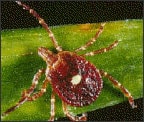At a glance
This page provides information on research publications and training about alpha-gal syndrome (AGS).

Publications
Recent publications on alpha-gal syndrome:
Binder AM, Commins SP, Altrich ML, Wachs T, Biggerstaff BJ, Beard CB, Petersen LR, Kersh GJ, Armstrong PA. Diagnostic testing for galactose-alpha-1,3-galactose, United States, 2010 to 2018.Ann Allergy Asthma Immunol. 2021 Apr;126(4):411-416.e1.
Carpenter A, Drexler NA, McCormick DW, Thompson JM, Kersh G, Commins SP, Salzer JS. Health care provider knowledge regarding alpha-gal syndrome—United States, March–May 2022. MMWR. 2023 July;72(30):809-814.
Chung CH, Mirakhur B, Chan E, et al. Cetuximab-induced anaphylaxis and IgE specific for galactose-alpha-1,3-galactose. N Engl J Med 2008;358(11):1109–17.
Commins SP, Satinover SM, Hosen J, et al. Delayed anaphylaxis, angioedema, or urticaria after consumption of red meat in patients with IgE antibodies specific for galactose-α-1,3-galactose. Journal of Allergy and Clinical Immunology 2009;123(2):426-433.e2.
Commins SP, James HR, Kelly LA, et al. The relevance of tick bites to the production of IgE antibodies to the mammalian oligosaccharide galactose-α-1,3-galactose. J Allergy Clin Immunol 2011;127(5):1286-1293.e6.
Commins SP, Jerath MR, Cox K, Erickson LD, Platts-Mills T. Delayed anaphylaxis to alpha-gal, an oligosaccharide in mammalian meat. Allergology International 2016;65(1):16–20.
Crispell G, Commins SP, Archer-Hartman SA, et al. Discovery of Alpha-Gal-Containing Antigens in North American Tick Species Believed to Induce Red Meat Allergy. Front Immunol 2019;10:1056.
Hashizume H, Fujiyama T, Umayahara T, Kageyama R, Walls AF, Satoh T. Repeated Amblyomma testudinarium tick bites are associated with increased galactose-α-1,3-galactose carbohydrate IgE antibody levels: A retrospective cohort study in a single institution. J Am Acad Dermatol 2018;78(6):1135-1141.e3.
Hilger C, Fischer J, Wölbing F, Biedermann T. Role and Mechanism of Galactose-Alpha-1,3-Galactose in the Elicitation of Delayed Anaphylactic Reactions to Red Meat. Curr Allergy Asthma Rep 2019;19(1):3.
Kersh GJ, Salzer J, Jones E, et al. Tick bite as a risk factor for alpha-gal-specific immunoglobulin E antibodies and development of alpha-gal syndrome. Ann Allergy Asthma Immunol. 2022 130(4): 472-478.
Kim MS, Straesser MD, Keshavarz B, et al. IgE to galactose-α-1,3-galactose wanes over time in patients who avoid tick bites. J Allergy Clin Immunol Pract 2020;8(1):364-367.e2.
Mabelane T, Basera W, Botha M, Thomas HF, Ramjith J, Levin ME. Predictive values of alpha-gal IgE levels and alpha-gal IgE: Total IgE ratio and oral food challenge-proven meat allergy in a population with a high prevalence of reported red meat allergy – PubMed (nih.gov). Pediatr Allergy Immunol 2018;29(8):841–9.
Mitchell CL, Lin F-C, Vaughn M, Apperson CS, Meshnick SR, Commins SP. Association between lone star tick bites and increased alpha-gal sensitization: evidence from a prospective cohort of outdoor workers. Parasites Vectors 2020;13(1):470.
Platts-Mills TAE, Li R, Keshavarz B, Smith AR, Wilson JM. Diagnosis and Management of Patients with the α-Gal Syndrome. The Journal of Allergy and Clinical Immunology: In Practice 2020;8(1):15-23.e1.
Taylor M, Kersh G, Salzer J, et al. Intrinsic risk factors for alpha-gal syndrome in a case-control study, 2019 to 2020. Ann Allergy Asthma Immunol. 2024 S1081-1206(24):74-7.
Thompson JM, Carpenter A, Kersh GJ, Wachs T, Commins SP, Salzer JS. Geographic distribution of suspected alpha-gal syndrome cases—United States, January 2017–December 2022. MMWR. 2023 July;72(30):815-820.
Wilson JM, Schuyler AJ, Workman L, et al. Investigation into the α-Gal Syndrome: Characteristics of 261 Children and Adults Reporting Red Meat Allergy. The Journal of Allergy and Clinical Immunology: In Practice 2019;7(7):2348-2358.e4.
Young I, Prematunge C, Pussegoda K, Corrin T, Waddell L. Tick exposures and alpha-gal syndrome: A systematic review of the evidence. Ticks and Tick-borne Diseases 2021;12(3):101674.
